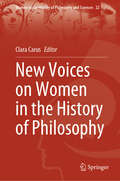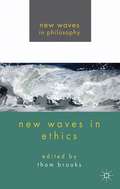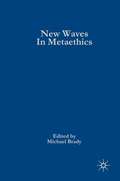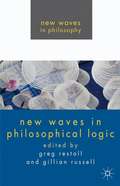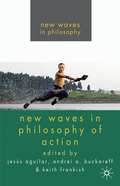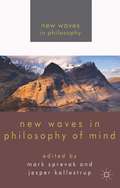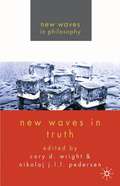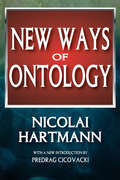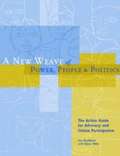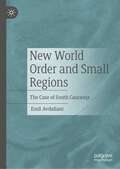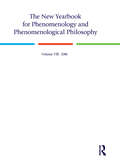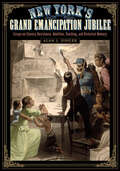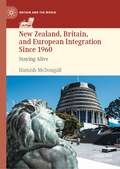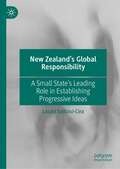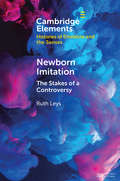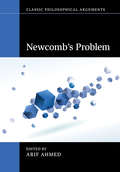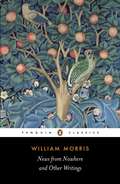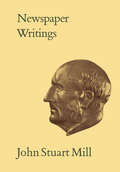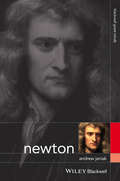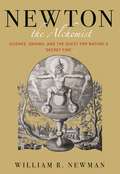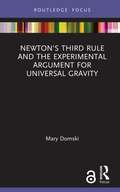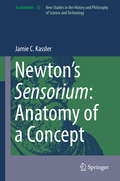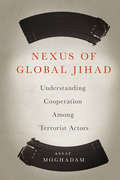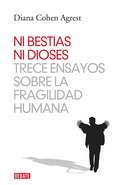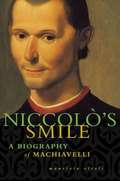- Table View
- List View
New Voices on Women in the History of Philosophy (Women in the History of Philosophy and Sciences #22)
by Clara CarusThis book promotes entirely new insights into women’s contributions to the history of philosophy and boasts papers spanning the centuries from Antigone until twentieth century phenomenology, covering fields from logic to mysticism, stretching from Brazil to Early Modern Europe. The book is of interest for all scholars and students of the history of philosophy, but especially for those who are interested in women philosophers and in new narratives in the history of philosophy. The book is representative of the immense scope of academic discussion women were involved in over the centuries as well as their varying styles and methods. It features papers in logic and in mysticism, presents papers on female authors in Antiquity and in the twenty-first century and it includes papers on phenomenology and analytic philosophy. The chapters consider philosophical positions in literature and drama, in letters and in classical philosophical treatises, ensuring this book contributes significantly to research on the individual women authors, who are all to date still understudied figures.
New Waves in Ethics
by Thom BrooksBringing together the leading future figures in ethics broadly construed with essays ranging from metaethics and normative ethics to applied ethics and political philosophy, topics include new work on experimental philosophy, feminism, and global justice incorporating perspectives informed from historical and contemporary approaches alike.
New Waves in Metaethics
by Michael BradyMetaethics occupies a central place in analytical philosophy, and the last forty years has seen an upsurge of interest in questions about the nature and practice of morality. This collection presents original and ground-breaking research on metaethical issues from some of the very best of a new generation of philosophers working in this field.
New Waves in Philosophical Logic
by Greg Restall Gillian RussellPhilosophical logic has been, and continues to be, a driving force behind much progress and development in philosophy more broadly. This collection by up-and-coming philosophical logicians deals with a broad range of topics, including, for example, proof-theory, probability, context-sensitivity, dialetheism and dynamic semantics.
New Waves in Philosophy of Action
by Keith Frankish Jes 250 S H. Aguilar Andrei A. BuckareffA collection of original, state-of-the-art essays by some of the best young philosophers working on the myriad problems of action and agency. Each one has already made important contributions to the philosophy of action and cognate areas. The chapters reflect their research and make a significant contribution to some debate in the field.
New Waves in Philosophy of Mind
by Mark Sprevak Jesper KallestrupPhilosophy of mind is one of the core disciplines in philosophy. The questions that it deals with are profound, vexed and intriguing. This volume of 15 new cutting-edge essays gives young researchers a chance to stir up new ideas. The topics covered include the nature of consciousness, cognition, and action.
New Waves in Truth
by Cory D. Wright Nikolaj J. L. L. PedersenWhat is truth? Philosophers are interested in a range of issues involving the concept of truth beginning with what sorts of things can be true. This is a collection of eighteen new and original research papers on truth and other alethic phenomena by twenty of the most promising young scholars working on truth today.
New Ways of Ontology
by Predrag Cicovacki Nicolai HartmannContemporary philosophy has reasserted the belief that philosophy has practical tasks. This turn reflects an understanding that the life of the individual and the community is not molded merely by personal needs and fortunes but also by the strength of dominant ideas. For Nicolai Hartmann, ideas are spiritual powers belonging to the realm of thought, but thought has its own strict discipline and critique of events. In his view, theory must include within its scope problems of the contemporary world and cooperation in work that needs doing.New Ways of Ontology stands in opposition to the tradition of Heidegger. With deep appreciation of the history of philosophical controversy, Hartmann divides mistakes of the old ontology into those related to its method and those concerning its content. Hartmann finds a common mistake behind methodological approaches inspired by late German romanticism in attempts to develop a complete systematic account of the categories of being—not only of the ideal, but of real being.The main task of New Ways of Ontology is to reveal and analyze interdependences and interconnections. The divisions of being and becoming, of the separation of existence and essence, as well as the old view that the real and the ideal exclude each other, require revision. For Hartmann, whose ideas take us close to modern social science research, ontology is the neutral category that includes subject and object, and gets beyond old realism and modern idealism alike.
New Weave of Power, People and Politics: The Action Guide for Advocacy and Citizen Participation
by Lisa Veneklasen Valerie MillerA practical handbook for activists, grassroots, and advocacy groups · Covers constituency building and the theory behind the practice · "a significant contribution to the growing international literature on citizen participation and advocacy A New Weave has been needed for a long time. "--John Gaventa, Institute of Development Studies. This book breaks down the boxes separating human rights, rule of law, development, and governance, and creates an integrated approach to rights-based political empowerment. It combines concrete and practical action 'steps' with a sound theoretical foundation to help users understand the process of advocacy planning and implementation. Building on the authors' fifty years of combined experiences in advocacy, gender, human rights, education, and social change, this "action guide" gathers insights from across the world--including community development, legal rights education, and campaign advocacy. It includes a special training and capacity-building appendix that provides workshop and planning ideas for different users and needs.
New World Order and Small Regions: The Case of South Caucasus
by Emil AvdalianiThe book provides a comprehensive understanding of the unfolding geopolitical changes in the South Caucasus in the age of increased great power competition across Eurasia. Recent research on the geopolitics of the South Caucasus focuses either on interstate relations among Armenia, Azerbaijan and Georgia or on each of regional actor’s (Russia, Turkey and Iran) ties with the region’s one or all three states. Little attempt has been made to see the region’s shifting geopolitical importance from a global perspective: growing US-China rivalry and shifting balance of power in Eurasia; recalibration of the US’ military and diplomatic vision in western Eurasia to adjust to the Chinese challenge. The book argues, from a theoretical point of view, that the increased competition in the region fits into the global pattern of unfolding great power competition, when military and economic calculations drive regional powers to increase their influence on immediate neighborhoods sidelining the collective West from the negotiating table and the emerging new security architecture.
New Yearbook for Phenomenology and Phenomenological Philosophy: Volume 8
by M. BrainardThe New Yearbook for Phenomenology and Phenomenological Philosophy provides an annual international forum for phenomenological research in the spirit of Husserl's groundbreaking work and the extension of this work by such figures as Scheler, Heidegger, Sartre, Levinas, Merleau-Ponty and Gadamer.
New York's Grand Emancipation Jubilee: Essays on Slavery, Resistance, Abolition, Teaching, and Historical Memory
by Alan J. SingerIn this book Alan J. Singer discusses the history of race and racism in the United States, emphasizing the continuing significance of slavery's past in shaping our present. Each chapter addresses a different theme in the history of slavery and the abolitionist struggle in the United States, with a focus on events and debates in New York State. Chapters examine the founders of the new nation and their views on slavery and equality; African American resistance; how abolitionists moved from the margins to the center of political debate; key players in the anti-slavery struggle such as David Ruggles, Solomon Northup, Harriet Tubman, Frederick Douglass, William Seward, and Abraham Lincoln; celebrations of freedom; as well as ongoing racism. Interspersed throughout the text are teaching notes that explore primary source documents and resources. The book draws on the latest scholarship to address and correct historical myths about both New York State before, during, and after the American Civil War, especially the pro-slavery, anti-civil rights stance of New York Copperhead Democrats in Congress, and the crucial role of Black and White abolitionists in ending slavery in the United States and challenging racial injustice. New York's Grand Emancipation Jubilee is not only an effort to include more African Americans as historical actors and celebrate their activism and achievements, but to provide an opportunity to analyze historical moments for change, explore their dynamic, and discover the conditions that make some of them successful.
New Zealand, Britain, and European Integration Since 1960: Staying Alive (Britain and the World)
by Hamish McDougallThis book explores how New Zealand, a small country almost as far from Western Europe as it is possible to be, assumed political importance in Britain’s accession to the European Community vastly out of proportion to its size, proximity and strategic position. At several points in accession negotiations, the issue of New Zealand’s continued trade with Britain threatened to derail UK Government attempts to join the Community. This issue also interacted with the broader context of the Cold War, economic shocks and decolonisation, materially affecting the terms of entry into the European Community, and altering Britain’s relations with its European partners and the British public’s perceptions of British membership. After entry, New Zealand continued to resurface as a continued source of tension between Britain and an integrating Europe. The role that New Zealand played sheds light on Britain’s attempts to retain global influence after the demise of its formal empire. Contributing to a growing body of research which challenges the traditional historical narratives of British ‘decline’ and colonial ‘independence’ in the second half of the twentieth century, this book fills an important gap in the historiography of Britain following the 1973 enlargement of the European Communities.
New Zealand’s Global Responsibility: A Small State’s Leading Role in Establishing Progressive Ideas
by László Szöllősi-CiraNew Zealand often plays leading roles in implementing progressive ideas. This book investigates what explanatory factors facilitated the country to become such a relevant normative actor. New Zealand’s case suggests that democratic institutions, skilled bureaucracy, and ambitious politicians play the crucial roles to create global influence. The case studies included in this book develop the argument that small states can better influence international politics by focusing on domestic issues. In contributing to discourses on New Zealand’s possible future role, the book is an invaluable resource to intellectuals, researchers, and students alike.
Newborn Imitation: The Stakes of a Controversy (Elements in Histories of Emotions and the Senses)
by Ruth LeysNewborn imitation has recently become the focus of a major controversy in the human sciences. New studies have reexamined the evidence and found it wanting. Imitation has been regarded as a crucial capability of neonates ever since 1977, when two American psychologists first published experiments appearing to demonstrate that babies at birth are able to copy a variety of facial movements. The findings overturned decades of assumptions about the competence of newborns. But what if claims for newborn imitation are not true? Influential theories about the mechanisms underlying imitation, the role of mirror neurons, the nature of the self and of infant mental states, will all have to be modified or abandoned if it turns out that babies cannot imitate at birth. This Element offers a critical assessment of those theories and the stakes involved.
Newcomb's Problem (Classic Philosophical Arguments)
by Arif AhmedNewcomb's problem is a controversial paradox of decision theory. It is easily explained and easily understood, and there is a strong chance that most of us have actually faced it in some form or other. And yet it has proven as thorny and intractable a puzzle as much older and better-known philosophical problems of consciousness, scepticism and fatalism. It brings into very sharp and focused disagreement several long-standing philosophical theories on practical rationality, on the nature of free will, and on the direction and analysis of causation. This volume introduces readers to the nature of Newcomb's problem, and ten chapters by leading scholars present the most recent debates around the problem and analyse its ramifications for decision theory, metaphysics, philosophical psychology and political science. Their chapters highlight the status of Newcomb's problem as a live and continuing issue in modern philosophy.
News From Nowhere And Other Writings
by William Morris Clive WilmerPoet, pattern-designer, environmentalist and maker of fine books, William Morris (1834-96) was also a committed socialist and visionary writer, obsessively concerned with the struggle to achieve a perfect society on earth. News From Nowhere, one of the most significant English works on the theme of utopia, is the tale of William Guest, a Victorian who wakes one morning to find himself in the year 2102 and discovers a society that has changed beyond recognition into a pastoral paradise, in which all people live in blissful equality and contentment. A socialist masterpiece, News From Nowhere is a vision of a future free from capitalism, isolation and industrialisation. This volume also contains a wide selection of Morris's writings, lectures, journalism and letters, which expand upon the key themes of News From Nowhere.
Newspaper Writings: Volumes XXII-XXV
by John Stuart Mill John Robson Ann RobsonFor just over fifty years John Stuart Mill contributed articles and letters to the newspapers, setting before the public a radical position on contemporary events. From 1822 to 1873, in newspapers as widely read as The Times and the Morning Chronicle, and as narrowly circulated as the True Sun and the New Times, he praised his friends and damned his opponents, while commenting on a while range of issues at home and abroad, from banking to Ireland, from wife-beating to land nationalization. His main series of newspaper writings concerned France (especially during the first four years of the Revolution of 1830) and Ireland (especially during December 1846 and January 1847, when various proposals for relief of the starving cottiers were being debated). Mill felt himself peculiarly fitted to explain French affairs and Irish solutions to the non-comprehending and wrong-headed English. But his pen was wielded wherever he say stupidity and narrowness, and he found them in astonishingly varied areas. He tried to explain to his obdurate countrymen the first principles of law reform, political economy, relations between the sexes, democracy, international law, and much more. Virtually none of these texts have been reprinted before this volume. The Introduction by Ann Robson sets the items in their historical and personal perspective, and draws out the implications for Mill's life and thought. The Textual Introduction by John Robson gives an account of the sources of the texts, and lays out principles and methods followed in the editing. The Mill that emerges from these pages is a fighting journalist, uninhibited, forthright, and often brilliantly satirical, testing his theoretical opinions in the real world, gradually maturing and developing a practical philosophy whose influence has been felt well into our own time.
Newton
by Andrew JaniakNewton is an evocative intellectual history of the life and ideas of Isaac Newton the natural philosopher, covering his influential thoughts about philosophical problems, our knowledge of nature, and even the nature of the divine. Offers a comprehensive and highly accessible introduction to the life and ideas of Isaac Newton, emphasizing his influential contributions to the field of philosophy Covers the principal philosophical topics that captivated Newton's mind, from our knowledge of nature to the nature of the divine Includes the most recent and innovative research regarding Newton's views on theology and philosophy Emphasizes the philosophical importance of Newton's work to the history of philosophy and his engagement with the ideas of both historic and contemporary figures such as Galileo and Descartes, Leibniz and Locke
Newton the Alchemist: Science, Enigma, and the Quest for Nature's "Secret Fire"
by William NewmanA book that finally demystifies Newton’s experiments in alchemyWhen Isaac Newton’s alchemical papers surfaced at a Sotheby’s auction in 1936, the quantity and seeming incoherence of the manuscripts were shocking. No longer the exemplar of Enlightenment rationality, the legendary physicist suddenly became “the last of the magicians.” Newton the Alchemist unlocks the secrets of Newton’s alchemical quest, providing a radically new understanding of the uncommon genius who probed nature at its deepest levels in pursuit of empirical knowledge.In this evocative and superbly written book, William Newman blends in-depth analysis of newly available texts with laboratory replications of Newton’s actual experiments in alchemy. He does not justify Newton’s alchemical research as part of a religious search for God in the physical world, nor does he argue that Newton studied alchemy to learn about gravitational attraction. Newman traces the evolution of Newton’s alchemical ideas and practices over a span of more than three decades, showing how they proved fruitful in diverse scientific fields. A precise experimenter in the realm of “chymistry,” Newton put the riddles of alchemy to the test in his lab. He also used ideas drawn from the alchemical texts to great effect in his optical experimentation. In his hands, alchemy was a tool for attaining the material benefits associated with the philosopher’s stone and an instrument for acquiring scientific knowledge of the most sophisticated kind.Newton the Alchemist provides rare insights into a man who was neither Enlightenment rationalist nor irrational magus, but rather an alchemist who sought through experiment and empiricism to alter nature at its very heart.
Newton's Third Rule and the Experimental Argument for Universal Gravity (Routledge Focus on Philosophy)
by Mary DomskiThis book provides a reading of Newton’s argument for universal gravity that is focused on the evidence-based, "experimental" reasoning that Newton associates with his program of experimental philosophy. It highlights the richness and complexity of the Principia and also draws important lessons about how to situate Newton in his natural philosophical context. The book has two primary objectives. First, it defends a novel interpretation of the third of Newton’s four Rules for the Study of Natural Philosophy – what the author terms the Two-Set Reading of Rule 3. Second, it argues that this novel interpretation of Rule 3 sheds additional light on the differences between Newton’s experimental philosophy and Descartes’s "hypothetical philosophy," and that it also illuminates how the practice of experimental philosophy allowed Newton to make a universal force of gravity the centerpiece of his explanation of the system of the world. Newton’s Third Rule and the Experimental Argument for Universal Gravity will be of interest to researchers and advanced students working on Newton’s natural philosophy, early modern philosophy, and the history of science.
Newton’s Sensorium: Anatomy of a Concept (Archimedes Ser. #53)
by Jamie C. KasslerThese chapters analyze texts from Isaac Newton’s work to shed new light on scientific understanding at his time. Newton used the concept of “sensorium” in writings intended for a public audience, in relation to both humans and God, but even today there is no consensus about the meaning of his term. The literal definition of the Latin term 'sensorium', or its English equivalent 'sensory', is 'thing that feels’ but this is a theoretical construct.The book takes readers on a process of discovery, through inquiry into both Newton’s concept and its underlying model. It begins with the human sensorium. This part of his concept is situated in the context of the aforesaid writings but also in the context of the writings of two of Newton's contemporaries, the physicians William Briggs and Thomas Willis, both of whom were at the forefront of their respective specialties of ophthalmology and neurology. Only once the human sensorium has been explored is it possible to generalize to the unobservable divine sensorium, because Newton's method of reasoning from experience requires that the second part of his concept is last in the order of knowledge. And the reason for this sequence is that his method, the short-hand term for which is 'analogy of nature', proceeds from that which has been observed to be universally true to that which is beyond the limits of observation. Consequently, generalization passes insensibly into reasoning by analogy.Readers will see how certain widespread assumptions can be called into question, such as that Newton was a theological voluntarist for whom the will is superior to the intellect, or that, for Newton, not only the world or universe but also God occupies the whole extent of infinite space. The insights afforded through this book will appeal to scholars of the philosophy of science, human physiology, philosophy of mind and epistemology, among others.
Nexus of Global Jihad: Understanding Cooperation Among Terrorist Actors (Columbia Studies in Terrorism and Irregular Warfare)
by Assaf MoghadamLeading jihadist groups such as al-Qaeda and the Islamic State dominate through cooperation in the form of knowledge sharing, resource sharing, joint training exercises, and operational collaboration. They build alliances and lesser partnerships with other formal and informal terrorist actors to recruit foreign fighters and spread their message worldwide, raising the aggregate threat level for their declared enemies. Whether they consist of friends or foes, whether they are connected locally or online, these networks create a wellspring of support for jihadist organizations that may fluctuate in strength or change in character but never runs dry. Nexus of Global Jihad identifies types of terrorist actors, the nature of their partnerships, and the environments in which they prosper to explain global jihadist terrorism's ongoing success and resilience.Nexus of Global Jihad brings to light an emerging style of "networked cooperation" that works alongside interorganizational terrorist cooperation to establish bonds of varying depth and endurance. Case studies use recently declassified materials to illuminate al-Qaeda's dealings from Iran to the Arabian Peninsula and the informal actors that power the Sharia4 movement. The book proposes policies that increase intelligence gathering on informal terrorist actors, constrain enabling environments, and disrupt terrorist networks according to different types of cooperation. It is a vital text for strategists and scholars struggling to understand a growing spectrum of terrorist groups working together more effectively than ever before.
Ni bestias ni dioses: Trece ensayos sobre la fragilidad humana
by Diana Cohen AgrestDiana Cohen Agrest nos acompaña en la elucidación de trece laberintosque nos conmueven en nuestra humana fragilidad. A través de unitinerario tan lúcido como provocativo, nos compromete íntimamente enuna reflexión sin concesiones en torno de nosotros mismos y de nuestrosvínculos con los otros. La tiranía del tiempo, el aburrimiento, la pereza, la felicidad, elautoengaño, la envidia, el morbo, el miedo, la vergüenza, el perdón, lavejez, la muerte, la inmortalidad# Los trece ensayos aquí reunidos seconsagran a examinar el material emocional que impulsa nuestrasdecisiones. Interrogarnos acerca de estas encrucijadas existenciales,cual estaciones de una travesía, nos ofrece la posibilidad de comprenderlos resortes con los que vamos perfilando nuestra propia vida.Entrelazando exquisitas contribuciones del psicoanálisis, la sociología,la antropología y la literatura en un fino entramado filosófico, laautora nos convoca a volvernos hacia nuestras fibras más personales,clausurando así el divorcio entre el pensar y el sentir. Diana CohenAgrest nos acompaña en la elucidación de trece laberintos que nosconmueven en nuestra humana fragilidad. A través de un itinerario tanlúcido como provocativo, nos compromete íntimamente en una reflexión sinconcesiones en torno de nosotros mismos y de nuestros vínculos con losotros.
Niccolo's Smile: A Biography Of Machiavelli
by Maurizio Viroli Antony ShugaarIn Niccolò's Smile, Maurizio Viroli brings to life the fascinating writer who was the founder of modern political thought. Niccolò Machiavelli's works on the theory and practice of statecraft are classics
